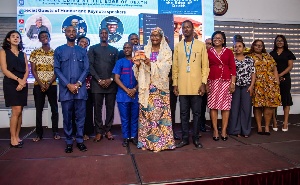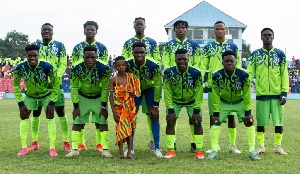- Home - News
- Elections 2024
- News Archive
- Crime & Punishment
- Politics
- Regional
- Editorial
- Health
- Ghanaians Abroad
- Tabloid
- Africa
- Religion
- Photo Archives
- Press Release
General News of Monday, 14 April 2025
Source: www.ghanawebbers.com
CSOs to train 1,200 indigenous youth and women in Northern Ghana to champion peace-building efforts
Three civil society organizations have teamed up to address violent conflict in northern Ghana. They aim to train 1,200 youth and women in four conflict-prone regions. This initiative will start in April.
The goal is to promote sustainable peace and strengthen community resilience. The organizations involved are Youth for Peace and Security - Africa (YPS-Africa), Citizens Network for Peace and Security in Africa (CNPSA), and the Centre for Rural and Urban Women in Peace, Security and Development.
They want to empower marginalized groups, especially young people and women. The training will focus on skills for conflict resolution, reconciliation, and leadership roles as peacebuilders.
Training sessions will take place in Tamale, Wa, Walewale, and Bolgatanga. These areas have faced historical tensions that continue today. Participants will learn about conflict prevention, trauma healing, mediation, civic leadership, and early warning systems.
Northern Ghana has seen rising ethnic tensions and land disputes recently. The ongoing Bawku conflict has caused unrest in several areas like Kusasi-Mamprusi. Violence has led to fatalities, mass displacement, and the deaths of security personnel trying to restore calm.
Despite efforts from government authorities through curfews and peace dialogues, conflicts persist. This highlights the need for grassroots-led peacebuilding strategies.
The CSOs emphasize that indigenous actors should lead these efforts. “Peacebuilding must be indigenous,” said Abraham Korbla Klutsey from YPS-Africa. He believes youth and women are vital for lasting peace.
The initiative aims to create a new generation of peace champions who can break cycles of violence. It aligns with national efforts to maintain peace in the north while recognizing contributions from various institutions.
Former President John Dramani Mahama's commitment to peace is also noted. His advocacy encourages stakeholders to rise above political divisions for unity.
The CSOs call for collaboration with government agencies, traditional authorities, development partners, the private sector, and media outlets. “We urge the media to amplify peace narratives,” said Hajia Hamdatu Ibrahim Hussein from the Centre for Rural Women.
This grassroots initiative not only focuses on building peace but also on empowering those often left out of policy discussions. By training 1,200 youth and women vulnerable to conflict but capable of resolving it, they hope to foster resilience and empathy.
If successful, this model could serve as a blueprint for other conflict-affected areas in Ghana and beyond. It aims to transform victims into peacebuilders within their communities.











